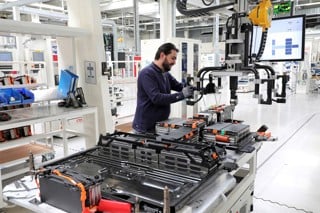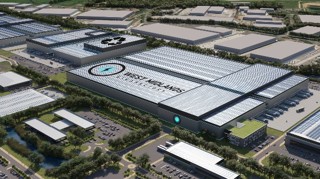Domestic car production is under threat in the UK unless more gigafactories are built and battery technology developed, suggests a new report.
With its accessibility to abundant natural resources, as well as government-driven support for high-volume manufacturing and local demand for electric vehicles, the majority of global battery production – roughly 70% – is currently in Asia.
The UK on the other hand, faces challenges including lack of skilled technicians on cell manufacturing processes and availability of critical raw materials, as well as high production costs, says the report's author manufacturing consultancy firm HSSMI.
Investing in more battery plants and bringing them as close as possible to car production – reducing supply chain challenges – can alleviate many of these issues, but the report says that industry needs to act fast.
“Electrification is increasing demand for the battery cells and packs powering electric vehicles,” said Axel Bindel, executive director at HSSMI.
“The UK in particular is at a pivotal moment. By 2040, there will be a need for 140GWh in battery cell capacity, equivalent to five gigafactories.
“Currently however, there is only 3GWh of production in the UK and, by 2030, just a further 45GWh planned, leaving a major gap – over 95GWh – between the rate of battery plant establishment, planning and the forecasted demand.”
HSSMI advises global OEMs and Tier 1 suppliers on the design of manufacturing plants, optimisation of production efficiency and introduction of circular economy principles.
Robin Foster, battery solutions lead at HSSMI, said: “Over the past three years, HSSMI has worked on cell manufacturing and gigafactory projects and our existing knowledge allows us to assist OEMs and Tier 1s in getting these new facilities opened faster.
“Typically, it could take a gigafactory up to five years from an initial idea to become fully operational. Demand for cell manufacturing, however, is expected to surge in the next four to five years.
“Our expertise in cell design, manufacture and commercialisation can dramatically speed this up, not to mention our network of some of the largest stakeholders in the industry, which brings us a step closer to creating a fully-formed supply chain.”
He continued: “We can’t focus just on gigafactory creation without being strategic about new technologies so in parallel, the UK must exploit and commercialise the wealth of new battery technology developed locally.
“The typical time, however, for new technology to become commercially ready can be 10 years from lab to high-volume production.”
HSSMI has laid out five key steps for the UK industry to accelerate gigafactory creation: make the most of what exists already; know your target market; understand the costs involved; conduct manufacturing feasibility studies early; and engage with scale-up specialists.
David Stewart, engineering director for research and innovation at HSSMI, said: “At the moment, the Envision AESC facility in Sunderland is the only UK facility manufacturing lithium-ion cells at scale (2-3GWh).
“AMTE Power and BritishVolt have both announced plans for UK-based Gigafactories, which will help supply local products to the UK automotive sector.
“Nonetheless, further investment into the UK automotive industry is crucial, as it has been plummeting since 2013 and in 2018 inwards investment amounted to only £0.59 billion.”
Government-backed bodies such as the Advanced Propulsion Centre and the Faraday Institution are continuously working to accelerate battery technology by promoting and catalysing innovation and collaboration between manufacturers, technology providers, automotive OEMs, research organisations, and academics, through various funding opportunities.
HSSMI believes it is critical that the Government continues to back the work of these organisations and that R&D funding is channelled into the automotive industry.
Britishvolt's new UK battery gigaplant will start production of EV batteries from 2023 and will scale to 300,000 units a year.
Global construction specialist ISG has been appointed to lead the build of the £2.6 billion project located at Blyth, Northumberland.
Meanwhile, plans for a Gigafactory at Coventry Airport will be submitted this year to increase the area’s attractiveness for investment.























Login to comment
Comments
No comments have been made yet.